Supreme Court Justice Samuel Alito says the leak earlier this year of a draft opinion reversing Roe v. Wade made conservative justices “targets for assassination” and changed the atmosphere at the court.
Alito’s comments came during a moderated conversation at the Heritage Foundation in the nation’s capital on Oct. 25. At the end of the discussion, Alito was presented with Heritage’s Defender of the Constitution Award.





